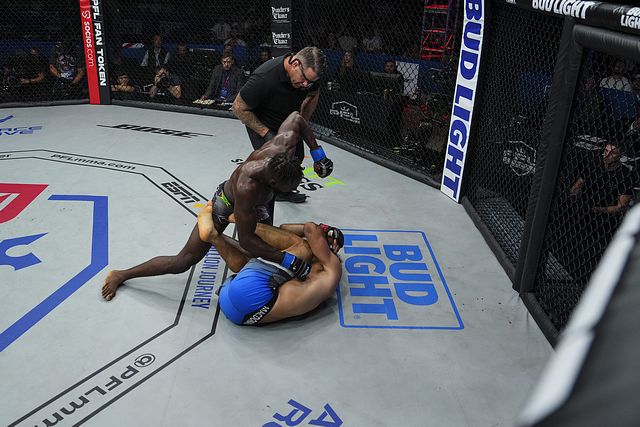Opinion: An Ill-Fated Path

Editor’s note: The views and opinions expressed below are those of the author and do not necessarily reflect the views of Sherdog.com, its affiliates and sponsors or its parent company, Evolve Media.
Rory MacDonald’s career has gone steadily downhill for many years now. His performances got worse and worse, even in victory, and he began losing fights he was expected to win. We don’t need to speculate about the reasons why, as they were helpfully provided by MacDonald himself. His heart simply wasn’t into fighting anymore. It’s rare in MMA to see a precipitous decline for a former elite champion like MacDonald and know the exact reasons why, so let’s look at his case in more detail. How did his lack of passion and enthusiasm manifest itself in his fighting. Why did he continue competing. What are some larger conclusions we can draw?
Advertisement
The lesson here is obvious. No matter how “safe” you believe your fighting style might be, if you’re going through the motions, you’re going to get hurt.
Why did MacDonald continue fighting, though? Why did every promo after a loss talk about how he was re-dedicated to the sport—a clear example of trying to fool oneself? Many will respond with “money,” but that’s not entirely true. There are, after all, any number of mixed martial artists who retire as soon as they’re not fully dedicated anymore. Nina Nunes at UFC on ESPN 41 was a fine example, exiting after a victory over Cynthia Calvillo. Mark Goodbeer retiring from MMA in 2019 also comes to mind. Michael McDonald, too. He retired after a superb 58-second knockout of Eduardo Dantas at Bellator 202 due to yet another significant hand injury.
There are two important differences with MacDonald, though. For one, he had a family, with his wife having given birth to their daughter in 2016 and a son in 2019. It wasn’t about himself but supporting his loved ones. Secondly, neither Nunes, Goodbeer nor McDonald were making a lot of money in MMA. Presumably, they could make a comparable wage with a different job, whether as a coach, in bareknuckle boxing or making furniture. That’s not the case for MacDonald, a genuine star who was making around $100,000 per fight at the end of his Ultimate Fighting Championship tenure, then a purported $400,000 for his Bellator MMA debut. He was likely well into the six figures for all his future bouts in Bellator and the PFL. That’s many times more money than he would have made in any other job, and it’s money his family was relying upon. Thus, he continued fighting long after his heart was no longer in it.
Can we take any larger lessons from this? Sadly, I think we will see more of this in the future from former stars since there is good money in them continuing to appear. Fighting demands complete dedication and involves both sacrifice and a repetitive grind that is difficult to keep meeting year after year. Cutting weight is sheer torture and bad for one’s long-term health, and being away from one’s family, at least for fight week, takes a toll, as well. A lot of fighters, with MacDonald being a prime example, fool themselves into thinking they can re-dedicate themselves to the sport. However, the cage is the ultimate truth machine for exposing falsehood, and there is no “safe style” to avoid damage. Fighters are far too dangerous and skilled nowadays, and even a man who was once one of the three best welterweights in the world can find himself being dominated and badly hurt by an unknown but hungry young contender after a few years of listlessness. Being doomed to continue fighting is a sad but unavoidable part of this sport, I’m afraid.
« Previous Get to Know London's Simeon Powell Ahead of PFL Playoffs
Next By The Numbers: Kayla Harrison vs. Martina Jindrova »
More




 PFL News & Features
PFL News & Features

